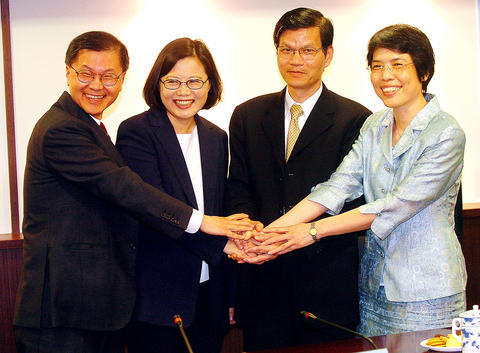The government is making a new push into the biotechnology sector by investing in a company that will focus on the development of a drug for treating AIDS.
The state-owned National Development Fund (NDF) will pump in US$20 million to help establish a biotech firm to be called TaiMed Biologics, Council for Economic Planning and Development Chairwoman Ho Mei-yueh (何美玥) told a press conference yesterday.
The move is one of a package of government measures designed to turn the nation's biotech industry into a trillion-dollar sector, following in the footsteps of the foundry and display industries.

PHOTO: CHEN TSE-MING, TAIPEI TIMES
Of the NT$30 billion (US$907 million) budget the government plans to invest in the biotech sector, the state fund has directly invested NT$8 billion in 12 biotech companies, Ho said, adding that the government could pump in more capital to fuel the industry's growth even after the budget is expended.
The new biotech company will be chaired by former vice premier Tsai Ying-wen (
David Ho told the press conference that, although it was impossible to know whether the NDF would see significant returns from its investment in TaiMed Biologics, this kind of investment is needed to stimulate the industry.
TaiMed Biologics purchased the patent for the drug TNX-355, which was developed by US-based Genentech Inc, and plans to complete development of the drug, which blocks HIV from entering human cells, in three years.
After launching TNX-355 on the global market, TaiMed Biologics will devote itself to developing flu and bird flu vaccines, he said.
If TaiMed Biologics later establishes a plant to manufacture drugs or other medical products, the NDF would also finance that, Ho Mei-yueh said.
Inviting private enterprises to jointly invest in TaiMed Biologics, the CEPD chairwoman said she had a shortlist of possible investors and would first approach Terry Gou (郭台銘), chairman of Hon Hai Precision Industry Co (鴻海精密).
On Sept. 4, Gou announced he would donate NT$15 billion to National Taiwan University to fund biomedical engineering projects and the construction of a hospital for treating cancer.
In June, Gou, who leads the world's largest contract maker of electronic components, reportedly said he would donate NT$100 billion to fund cancer research by scientists in Taiwan and China.
"I will brief him [to try to win] his support for the company [TaiMed Biologics]," Ho Mei-yueh said.
To encourage development of the biotechnology and pharmaceutical industry, the legislature in June passed tthe Biotech and New Pharmaceutical Development Statute (
The new law stipulates that 35 percent of company investment in R&D and personnel training in the two sectors is tax-deductible for the next five years.
If a firm's expenditure on R&D and personnel exceeds its average spending in the previous two years, 50 percent of the extra amount is tax-deductible.
In addition, employees in the industries who receive stock options do not need to pay income tax on their shares.
Government researchers who get permission from the institute where they are employed can also cooperate with private companies to develop new drugs, while researchers can work as consultants at private companies.

Sweeping policy changes under US Secretary of Health and Human Services Robert F. Kennedy Jr are having a chilling effect on vaccine makers as anti-vaccine rhetoric has turned into concrete changes in inoculation schedules and recommendations, investors and executives said. The administration of US President Donald Trump has in the past year upended vaccine recommendations, with the country last month ending its longstanding guidance that all children receive inoculations against flu, hepatitis A and other diseases. The unprecedented changes have led to diminished vaccine usage, hurt the investment case for some biotechs, and created a drag that would likely dent revenues and

Global semiconductor stocks advanced yesterday, as comments by Nvidia Corp chief executive officer Jensen Huang (黃仁勳) at Davos, Switzerland, helped reinforce investor enthusiasm for artificial intelligence (AI). Samsung Electronics Co gained as much as 5 percent to an all-time high, helping drive South Korea’s benchmark KOSPI above 5,000 for the first time. That came after the Philadelphia Semiconductor Index rose more than 3 percent to a fresh record on Wednesday, with a boost from Nvidia. The gains came amid broad risk-on trade after US President Donald Trump withdrew his threat of tariffs on some European nations over backing for Greenland. Huang further

CULPRITS: Factors that affected the slip included falling global crude oil prices, wait-and-see consumer attitudes due to US tariffs and a different Lunar New Year holiday schedule Taiwan’s retail sales ended a nine-year growth streak last year, slipping 0.2 percent from a year earlier as uncertainty over US tariff policies affected demand for durable goods, data released on Friday by the Ministry of Economic Affairs showed. Last year’s retail sales totaled NT$4.84 trillion (US$153.27 billion), down about NT$9.5 billion, or 0.2 percent, from 2024. Despite the decline, the figure was still the second-highest annual sales total on record. Ministry statistics department deputy head Chen Yu-fang (陳玉芳) said sales of cars, motorcycles and related products, which accounted for 17.4 percent of total retail rales last year, fell NT$68.1 billion, or

MediaTek Inc (聯發科) shares yesterday notched their best two-day rally on record, as investors flock to the Taiwanese chip designer on excitement over its tie-up with Google. The Taipei-listed stock jumped 8.59 percent, capping a two-session surge of 19 percent and closing at a fresh all-time high of NT$1,770. That extended a two-month rally on growing awareness of MediaTek’s work on Google’s tensor processing units (TPUs), which are chips used in artificial intelligence (AI) applications. It also highlights how fund managers faced with single-stock limits on their holding of market titan Taiwan Semiconductor Manufacturing Co (TSMC, 台積電) are diversifying into other AI-related firms.